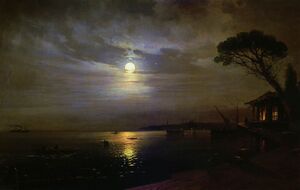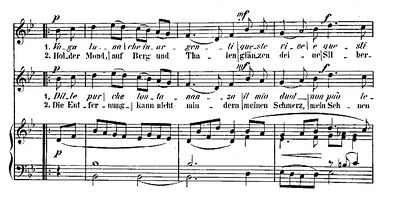Vaga luna, che inargenti
| Vaga luna, che inargenti | |
|---|---|
 "Moonlit Night" by Ivan Aivazovsky | |
| Key | A-flat major |
| Dedication | Giulietta Pezzi |
| Published | 1838 |
| Publisher | Casa Ricordi |
"Vaga luna, che inargenti" is a song written by Vincenzo Bellini. The author of the text is unknown. It was contained in the Tre ariette inedite published by Casa Ricordi in 1838 and is a frequent recital piece since.[1]
As of 2021, it does not appear on any album. It is part of the following concert program:
| Year | Concert program | With |
|---|---|---|
| 2021 ‐ 2022 | À sa guitare (Concert program) | Thibaut Garcia |
Libretto
Vincenzo Bellini (music), anonymous (words)
Vaga luna, che inargenti | |
Beautiful moon, dappling with silver Translation via English Wikipedia[1] | |
Holder Mond, auf Berg und Thalen Translation 1887 Haslinger, Wien[2] | |
Clair ruisseau dont l’onde pure* Translation 1838 Artist. Inst.[3] | |
Manuscripts and sheet music
- Free Sheet music
- Il bel canto: 30 Arien und Canzonen italienischer Meister
- 1887 Haslinger Wien
- Public Domain
- "Vaga luna che inargenti (Bellini, Vincenzo)". IMSLP, Il bel canto: 30 Arien und Canzonen italienischer Meister. Haslinger Wien. 1887. Archived from the original on October 1, 2021. Retrieved October 1, 2021.
References
- ↑ 1.0 1.1 "Vaga luna, che inargenti". Wikipedia. Archived from the original on October 1, 2021. Retrieved October 1, 2021.
- ↑ "Vaga luna che inargenti (Bellini, Vincenzo)". IMSLP, Il bel canto: 30 Arien und Canzonen italienischer Meister. Haslinger Wien. 1887. Archived from the original on October 1, 2021. Retrieved October 1, 2021.
- ↑ Vaga Luna che inargenti. Original aus:Bayerische Staatsbibliothek: Artist. Inst. 1838. p. 2.
